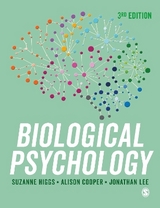
Biological Psychology
SAGE Publications Ltd (Verlag)
978-1-5264-6096-7 (ISBN)
- Titel erscheint in neuer Auflage
- Artikel merken
The challenge of teaching bio-psychology is first getting students up to speed with the basic brain functions and terminology, then applying this to psychology and finally developing critical thinking about the subject. This book uniquely addresses all three of these issues and provides a resource that supports students at each of these different levels of understanding.
Key features include:
• New video animations for the biology chapters and many high-quality illustrations throughout, helping students grasp the basic neuroanatomy and microbiology.
• ′Check your understanding′ questions in the book and MCQs online help students test their understanding and prepare for assessments.
• Chapters cover the need-to-know topics for psychology students with ′Insight′ and ′Focus on Methods′ boxes, highlighting these topics′ relevance to real-world research and applications.
• Spotlights build on the chapters, delving deeper into contemporary debates, issues and controversies around topical areas such as post-traumatic stress disorder, obesity and pain.
Professor Suzanne Higgs has a degree in Psychology, Philosophy and Physiology from the University of Oxford, UK. During her degree she became fascinated by the effects of drugs on the brain and behaviour, which motivated her to pursue a PhD in Psychopharmacology at the University of Durham. After her PhD, she worked as a Postdoctoral researcher at the University of Oxford before moving to the University of Birmingham, UK to take up a faculty position in the School of Psychology. She has taught at all levels on the BSc in Psychology programme at Birmingham and has over 20 years of lecturing experience. She specialises in teaching psychopharmacology and the biological bases of motivated behaviours, in particular, the psychobiology of appetite, which is the topic of her research. Dr Alison Cooper’s interest in Neuroscience began during her Natural Sciences degree when she accidentally found herself studying the properties of neurones that form the circuit that controls grasshopper movement. She pursued an interest in understanding how the activity of neuronal cells could underpin behaviour for her PhD by researching the properties and functions of the parts of the brain that contribute to human motor behaviour. During this time, she became interested in neuropharmacology, and the link between synaptic neurotransmission and human function/ dysfunction has remained the focus of her thoughts. Following various Postdoctoral positions, she took an ever-greater role in Neuroscience education of undergraduates in various professional and non-professional undergraduate programmes. In recent years she has used her experience to extend her interest in education to the public who want to understand their own or others’ brains through public engagement in person and, globally, through online courses. Professor Jonathan Lee has a degree in Natural Sciences, specialising in Neuroscience, from the University of Cambridge. He has always been interested in the value of studying biological mechanisms in order to understand behaviour. This interest has been particularly focused on unconscious memories and their impact on behaviour. In his PhD and Postdoctoral research, also at the University of Cambridge, he studied the contribution of gene expression and pharmacological mechanisms in the processes underlying long-term fear and addictive drug memories. He has continued these research interests since moving to the University of Birmingham, using his research experience to teach an introduction to Biological Psychology in the BSc Psychology programme.
Chapter 1: What is biological psychology?
Chapter 2: Structure and communication in the nervous system
Chapter 3: Drugs and the nervous system: psychopharmacology
Spotlight 3a: Individual differences in drug responses
Chapter 4: Development, degeneration and recovery in the nervous system
Spotlight 4a: Behavioural genetics
Spotlight 4b: Neurodegeneration
Chapter 5: The importance of experience: learning and memory
Spotlight 5a: Memory persistence
Chapter 6: Sensory systems
Spotlight 6a: Retinal spatial processing
Spotlight 6b: Pain
Chapter 7: Motor control
Spotlight 7a: Mirror neurons
Chapter 8: Emotional behaviours
Spotlight 8a: The neural basis of fear
Spotlight 8b: Too much emotion? Post-traumatic stress disorder and drug addiction
Chapter 9: Motivated behaviours
Spotlight 9a: Sleep disturbances and implications for health
Spotlight 9b: Eating disorders and obesity
Chapter 10: Psychological disorders
Spotlight 10a: Schizophrenia
| Erscheinungsdatum | 05.12.2019 |
|---|---|
| Verlagsort | London |
| Sprache | englisch |
| Maße | 195 x 265 mm |
| Gewicht | 1530 g |
| Themenwelt | Geisteswissenschaften ► Psychologie ► Biopsychologie / Neurowissenschaften |
| ISBN-10 | 1-5264-6096-3 / 1526460963 |
| ISBN-13 | 978-1-5264-6096-7 / 9781526460967 |
| Zustand | Neuware |
| Informationen gemäß Produktsicherheitsverordnung (GPSR) | |
| Haben Sie eine Frage zum Produkt? |
aus dem Bereich



